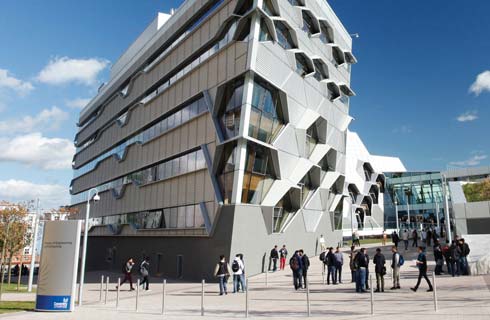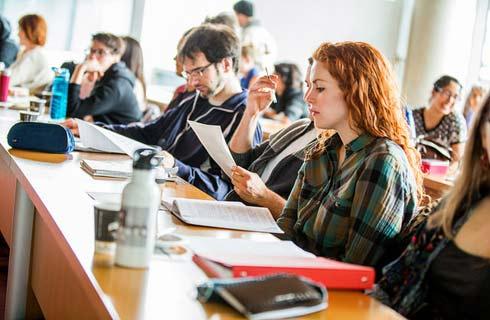- IDP China>
- 课程库>
- 社会科学>
- 传播学与新闻学>
- 传播与修辞>
- Doctor of Philosophy in Communication, New Media and Cultural Studies
传播,新媒体和文化研究哲学博士
Doctor of Philosophy in Communication, New Media and Cultural Studies

学历文凭
Ph.D.

专业院系
Department of Communication Studies and Multimedia

开学时间

课程时长

课程学费

国际学生入学条件
IDP—雅思考试联合主办方

雅思考试总分
7.0
- 雅思总分:7
- 托福网考总分:100
- 托福笔试总分:600
- 其他语言考试:NA
CRICOS代码:
申请截止日期: 请与IDP联系 以获取详细信息。
课程简介
The challenges we face today—social and environmental injustice, climate change, precarious work, surveillance, and a shrinking public sphere—are big, complex and multifaceted. Among their many other dimensions, they are questions of communication and culture, which demand urgent engagement. The PhD in Communication, New Media, and Cultural Studies (CNMCS) is for creative students who embrace complexity, love difficult questions, and hunger for intellectual, artistic, and pedagogical risk-taking driven towards positive social change. This program brings together three interdisciplinary fields that all originated in attempts to understand and debate big problems using tools from the arts, humanities, and social sciences: cultural studies began by trying to articulate the significance of culture beyond the privileged space of the university, communication studies wanted to understand how mass media was changing modern society, and new media scholars and artists wanted to probe how computing and digital communications were changing human knowledge and creativity. Each of these fields understands that the problems we face today, with all their varied technological, economic, ecological, and political implications, are, fundamentally, problems of communication and culture. Learning to read, critique, and create culture, media, and communication is critical to seeing things, and doing things, in new ways. The PhD in Communication, New Media, and Cultural Studies (CNMCS) is a joint program between the Departments of Communication Studies and Multimedia (CSMM) and the Department of English and Cultural Studies (ECS). Our many complementary strengths are in areas including new media arts, performance, policy, visual culture, digital culture, musicsound, gender and sexuality, critical race studies, indigenous studies, postcolonial and diasporic studies, transnational culture and international communications, critical environmental studies, political economy, professional communication, and media analysis and strategy. The program draws faculty members from CSMM and ECS as well as other departments in the Humanities to act as supervisors of CNMCS doctoral students.
相关申请
 预科
预科 奖学金
奖学金 实习机会
实习机会 在校学习
在校学习 跨境学习
跨境学习 校园授课-线上开始
校园授课-线上开始 在线/远程学习
在线/远程学习
开学时间&学费
学费信息仅供参考,请与IDP联系以获取详细信息
| 开学时间 | 时长 | 学费 | 地点 |
|---|
学校排名

世界排名77
数据源:
泰晤士高等教育世界大学排名
关于麦克马斯特大学

麦克马斯特大学是世界顶尖大学之一,以其开创性的教育方法、基于问题的学习承诺和研究卓越而闻名。麦克马斯特大学位于加拿大安大略省汉密尔顿市--一个充满活力的多元文化城市,靠近多伦多。校园美丽、便利且适合步行,为来自世界各地的学生提供了一个温馨的环境。校园内有13个宿舍,学生可以住在离讲堂、实验室和先进学习设施仅几步之遥的地方。麦克马斯特的创新课程为学生提供了全球成功职业所需的实用技能和知识。从医疗保健的前沿研究到可持续能源的突破性发展,麦克马斯特的学生在整个学术旅程中都在为解决现实世界的挑战做出贡献。麦克马斯特在加拿大学生服务排名第一,高度重视在学术和个人方面支持学生,确保他们从申请到毕业后的长期发展都能茁壮成长。作为加拿大领先的研究密集型大学之一,麦克马斯特培养了发现、合作和创新的文化。无论是推进公共卫生、制定环境政策还是设计更智能的技术,麦克马斯特的学生和研究人员都在跨学科合作,为全球创建更健康、更可持续和更繁荣的社区。麦克马斯特拥有来自世界各地的多元化学生、教职员工,致力于包容性和卓越性,营造了一个未来领导者、创新者和变革者共同建设更美好世界的环境。
本校相关课程
其他相关课程

传播学文学士
 劳伦森大学
劳伦森大学学历文凭
Bachelor Degree
开学日期
课程费用总额


修辞与传播学学士学位
 温尼伯大学
温尼伯大学学历文凭
Bachelor Degree
开学日期
课程费用总额


专业传播学文学士
 皇家大学
皇家大学学历文凭
Bachelor Degree
开学日期
课程费用总额


传播学文学士
 劳瑞尔大学
劳瑞尔大学泰晤士高等教育世界大学排名:1491
学历文凭
Bachelor Degree
开学日期
课程费用总额


英语文学士-修辞学[一般]
 滑铁卢大学
滑铁卢大学学历文凭
Bachelor Degree
开学日期
课程费用总额


英语文学士-修辞学
 滑铁卢大学
滑铁卢大学学历文凭
Bachelor Degree
开学日期
课程费用总额
















